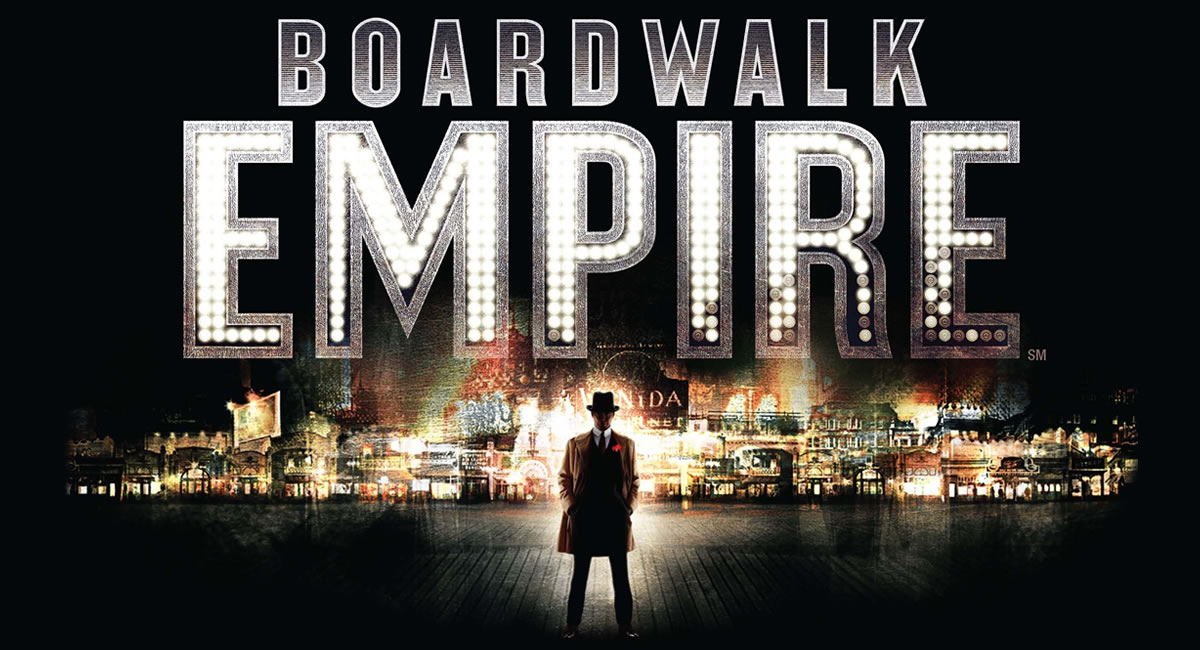Academy Award winning director Martin Scorsese has made an illustrious start to his ventures on cable TV with the airing of the new series Boardwalk Empire. Set in the roaring twenties it takes place just after the announcement of prohibition and the eventual strangle hold the criminal element would have distributing alcohol and the rise of the mob in general. The pilot episode was directed by Scorsese and premiered last week on HBO with a record breaking viewership of more than 7 million people tuning in to make it the most watched pilot since 2004’s ‘Deadwood’ which had ‘The Sopranos’ as a lead in.
The series was brought to HBO by Steve Levinson and his producing partner Mark Wahlberg who’s set set to make a fair penny from shepherding this project which is adapted from the book of the same name. Boardwalk Empire is set in Atlantic City when Jersey shore was famous for it’s brothels, bloodshed and bootleggers and follows the career of real-life Republican political boss and racketeer Enoch “Nucky” Johnson. The pivotal character is played by Steve Buscemi whose character is renamed to Thompson for the series. The rest of the cast includes Gretchen Mol as a showgirl, Michael Shannon as a Prohibition agent, Michael Pitt as an ambitious thug, Dabney Coleman as a veteran power broker. From the Cohen brothers films Kelly Macdonald (No Country for old men) and Michael Stuhlbarg (A Serious Man) plays Jewish mob kingpin Arnold Rothstein who reputedly fixed the 1919 World Series and from Michael Mann‘s Public Enemies Stephen Graham who played Baby Face Nelson, here he’s the young Al Capone.
When writer Terence Winter was interviewed by Collider on how the show came about, he told how it was towards the end of making The Sopranos that HBO asked him if he could develop this show and adapt a story from the dense book.
…’Why don’t you read it and see if there’s something in there that feels like a series to you.’ And, literally on the way out the door, they said, ‘Oh, and by the way, Martin Scorsese is attached to this, if you find a series there.’ So, I said, ‘I assure you that I will find a series here.’
Winter decided to focus specifically on the time period of the twenties, for now at least – as the book covers almost the entire century – so there’s plenty of material to serve as the basis for ongoing seasons. There are some variations to the historical time-line but the producers are trying to stay faithful as much as possible with only some changes made for narrative purposes.
The book is very dense… We took a small slice of it… We specifically focused on the 1920’s and then, at least for the beginning of the series… it was narrowed down considerably… Obviously, what makes the series unique is that we have fictional characters that interact with historical figures…
Check out an exclusive scene here.
[jwplayer config=”tv_wide” mediaid=”1933″]Courtesty of HBO
The character of Nucky Thompson has a name change from the actual person to allow the writers to take creative license without the need to stick firmly to facts about the real life Johnson – so that viewers don’t jump ahead via a wiki search – and unlike the various criminal cohorts featured, he lived well into his eighties.
At its center was this incredible lead character, Nucky Johnson, upon whose Steve’s character is based on. It’s fictionalized as Nucky Thompson. This was a guy who was just incredibly conflicted, as equal parts politician and gangster. And then, that was coupled with the massive changes going on in 1920, like Prohibition, women’s vote, broadcast radio coming in, World War I just having ended and the ‘20s about to boom. It was just this incredible pallet from which to draw stories and characters. It was just irresistible
The aesthetics of the show make it a stand out from regular TV, benefiting from the rich production design which recreates the entire beach front boardwalk complete with shops and pier, with digital set extensions to complete other elements. It’s an immersive and detailed throwback to the origins of organized crime in Atlantic city with a stunning visual transformation to a time period of more than ninety years ago.
The pilot episode is all Scorsese with his trademark visuals and exaggerated characters that are both grotesque and humorously refreshing. He blends a tonality of impending violence, reminiscent of ‘Goodfellas’ with visuals freezing for a split second during pivotal moments. Scenes are heightened by his stylistic angles and cool visual throwbacks to the silent era such as circular vignettes.
Martin Scorsese was also interviewed by Collider and spoke about making the pilot episode.
Based on what Terry had written, I just went ahead and tried to visualize the picture as best I could, just like with a feature film. I shot it quickly, and it was an energizing experience. I had a great time with the actors. I just visualized it the way I normally would with a feature film.
In true Scorsese form, popular music from that time is used to create a greater immersion of a long forgotten era. What makes it such a viewing feast is the director’s style which suits the ultra violent world of gangsters which he demonstrated so distinctly with Goodfellas – seen as a precursor to The Sopranos.
I think it’s the charting of this world and the underworld, as with Mean Streets, GoodFellas and Casino. The major urban areas had a lot of gang activity. Also, there is America’s love affair with the gangster as a tragic hero. It’s about how it resonates today, not only in America, but around the world. Alcohol decimated the working class and so many people. It’s also about how those characters or people like that interacted with the world, at that time.
When asked about his reasons for working on the HBO series, Scorsese spoke of how the TV landscape has changed:
I think it’s certainly interesting that what’s happening now, in the past nine or 10 years, particularly at HBO, was what we had hoped for in the mid-‘60s when films were being made for television. We hoped that there would be this kind of freedom, the ability to create another world and develop character in a long-form story and narrative … This is a good example, and HBO has really been the trailblazer in this, with the extraordinary series that they’ve had. I’ve been tempted, over the years, to be involved in one of them because of the nature of the long-form and the development of character and plot… It’s a new opportunity for storytelling, which is very different from television in the past. This was my inroad.
The second episode directed by Sopranos alum Tim Van Patten, has a consistent tone but lacks the framing devices which Scorsese uses to great effect. However it’s a show that has the potential for considerable longevity with the book spanning a large time period and the show’s popularity increasing with international distribution.
The fact that it comes from the Sopranos stable, is centered primarily on gangsters and has the Scorsese touch, it’s a sure bet that it will become a fixture of TV crime & thuggery for some time.
When asked if the legendary filmmaker would return to helm future episodes he replied:
I would like to, yes. It’s about scheduling issues, but I would like to very much.
Boardwalk Empire airs Sundays on HBO.
[imagebrowser id=2]
via: Collider


[…] show had the benefit of Martin Scorsese helming the first episode, and does an incredible job at capturing the era and recreating the cities of the twenties. Similar […]